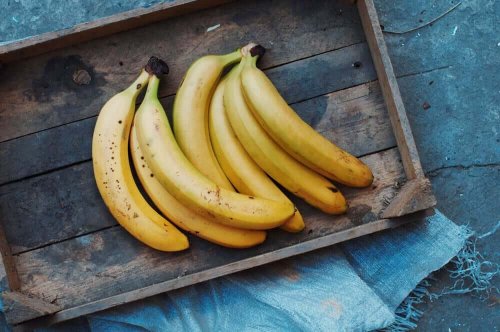Types of Food that Help Relieve Abdominal Pain


Reviewed and approved by the pedagogue in physical education and nutritionist Elisa Morales Lupayante
Abdominal pain is a very common symptom but there are ways to relieve it. It can develop from a digestive difficulty, or it can also be caused by bad habits. In a few cases, it’s caused by chronic inflammatory diseases. It could also be a change in your nervous system that comes from stress and anxiety, according to this study.
This problem is characterized by a sensation of inflammation in your abdominal area. It’s almost always accompanied by gas, acid, and other symptoms of indigestion. In fact, even though it might be due to food intolerance, it may also present itself with constipation and diarrhea.
Eating foods that aren’t healthy or eating too much increases their recurrence and intensity. However, there are certain foods that help you control this problem and the associated symptoms.
Types of food that help relieve abdominal pain
There’s no evidence to prove that food itself can cure abdominal pain. However, due to their properties, some of them might help soothe it.
Now, first of all, you must consider how frequent your stomachaches are, what are their possible causes are, and how severe they are. This is important because they’re often a symptom of an underlying disease.
If you think that might be the case then you should seek medical attention, as you may need other types of treatment. If it’s just mild discomfort, then you can try eating some of the following types of food.
Relieve abdominal pain with bananas

As per the article published by the Journal of Pharmacognosy and Phytochemistry, eating bananas helps reduce excess acidity in the gastrointestinal tract. Also, given that they are prebiotic, their intake promotes the growth of healthy bacteria in the intestine.
- They have high levels of potassium. This is necessary to regulate the electrolytes in your body after suffering from vomit or diarrhea.
- Also, they’re rich in natural sugar. Instead of affecting your glucose, they increase your energy levels and are sating.
Read also What Happens to Your Body If You Start Eating Two Bananas a Day
Applesauce for abdominal pain
Applesauce is a delicious quick solution for relieving stomach pain due to gastritis, indigestion. and diarrhea. It’s rich in dietary fiber, antioxidants, and essential nutrients that encourage digestion to get rid of waste.
It has a high concentration of pectin, a natural fiber. This reduces intestinal inflammation. And it encourages bowel movements, which may help with the symptoms of constipation. Besides, as per a study published by Nutrients magazine, it helps balance gut microbiota.
Vegetable soup
Vegetable soup is an excellent food option when you have digestive problems. It really helps with pain and dehydration.
The liquid, salt, and nutrients from the vegetables help your body stay well hydrated. At the same time, these minimize stomach irritation. This is because it doesn’t have high amounts of fat. This soup is very easy to digest and doesn’t cause any undesired effects.
Herbal infusions

Some non-caffeinated herbal infusions such as mint or chamomile can help reduce stomach inflammation. They also promote the removal of residues stored in the intestine. These teas are low in calories and rich in antioxidants.
They’re useful for managing stomach acid and avoid its passage to the upper body, as detailed by research published in the Journal of Alternative and Complementary Medicine.
Plus, they have antispasmodic and analgesic properties. Therefore, they help to reduce stomach pain caused both by pain and indigestion.
Coconut water
Organic coconut water is a great solution for relieving digestive discomfort and pain. This drink has many essential nutrients like vitamin C and potassium. Those nutrients are necessary for counteracting the effects of dehydration.
It has very few calories and it’s rich in natural fibers. Because of this, it may help increase bowel movements to prevent inflammation and constipation. It can have a positive effect on the symptoms of diarrhea. This is because its natural electrolytes prevent mineral salt imbalances.
Ginger
Known worldwide for its digestive and anti-inflammatory properties, ginger is an excellent solution against this type of pain. Its active compound, gingerol, not only gives it its particular spicy flavor. But also the ability to protect the stomach to control its main ailments.
In fact, as detailed in a study published in Food Science & Nutrition, it’s quite useful for relieving other symptoms such as nausea and vomiting. So, include it in shakes, soups, and other recipes as this is a great way to take advantage of its qualities and optimize stomach health.
Read also Irritable Bowel Syndrome: Teas and Juices that Improve Your Health
Yogurt

There are many reasons to include yogurt in your daily meals. For one, it helps prevent abdominal pain and other digestive disorders. According to information in The American Journal of Clinical Nutrition, yogurt is a natural probiotic that helps regulate the gut microbiota.
Conclusion
There are many foods that help improve digestive health and reduce some ailments. However, the evidence in regard to their effectiveness against abdominal pain is limited. Besides, it’s a symptom that could have multiple causes, so it’s safer to seek medical attention if it happens frequently.
All cited sources were thoroughly reviewed by our team to ensure their quality, reliability, currency, and validity. The bibliography of this article was considered reliable and of academic or scientific accuracy.
- K. P. Sampath Kumar, Debjit Bhowmik, S. Duraivel, M. Umadevi. (2012). Traditional and Medicinal Uses of Banana. Journal of Pharmacognosy and Phytochemistry. http://www.phytojournal.com/vol1Issue3/Issue_sept_2012/9.1.pdf
- Moreno-Salazar, S. F., Robles-Zepeda, R. E., & Johnson, D. E. (2008). Plant folk medicines for gastrointestinal disorders among the main tribes of Sonora, Mexico. Fitoterapia. https://doi.org/10.1016/j.fitote.2007.07.009
- Holtmann, G. (2010). Functional Gastroduodenal Disorders. In Practical Gastroenterology and Hepatology: Esophagus and Stomach. https://doi.org/10.1002/9781444327311.ch55
- Dulai, G. S., & Jensen, D. M. (2006). Treatment of watermelon stomach. Current Treatment Options in Gastroenterology. https://doi.org/10.1007/s11938-006-0036-1
- Jiang T, Gao X, Wu C, et al. Apple-Derived Pectin Modulates Gut Microbiota, Improves Gut Barrier Function, and Attenuates Metabolic Endotoxemia in Rats with Diet-Induced Obesity. Nutrients. 2016;8(3):126. Published 2016 Feb 29. doi:10.3390/nu8030126
- Salehi, M., Karegar-Borzi, H., Karimi, M., & Rahimi, R. (2017, February 1). Medicinal plants for management of gastroesophageal reflux disease: A review of animal and human studies. Journal of Alternative and Complementary Medicine. Mary Ann Liebert Inc. https://doi.org/10.1089/acm.2016.0233
- Kalman DS, Feldman S, Krieger DR, Bloomer RJ. Comparison of coconut water and a carbohydrate-electrolyte sport drink on measures of hydration and physical performance in exercise-trained men. J Int Soc Sports Nutr. 2012;9(1):1. Published 2012 Jan 18. doi:10.1186/1550-2783-9-1
- Nikkhah Bodagh M, Maleki I, Hekmatdoost A. Ginger in gastrointestinal disorders: A systematic review of clinical trials. Food Sci Nutr. 2018;7(1):96–108. Published 2018 Nov 5. doi:10.1002/fsn3.807
- Adolfsson, O., Meydani, S. N., & Russell, R. M. (2004, August). Yogurt and gut function. American Journal of Clinical Nutrition. https://doi.org/10.1093/ajcn/80.2.245
This text is provided for informational purposes only and does not replace consultation with a professional. If in doubt, consult your specialist.








